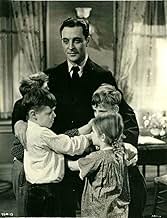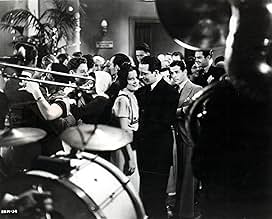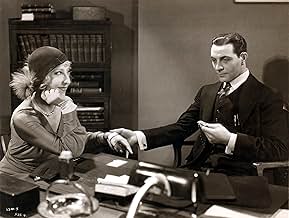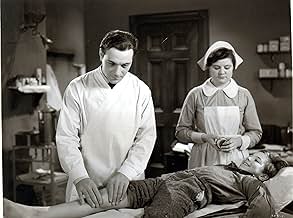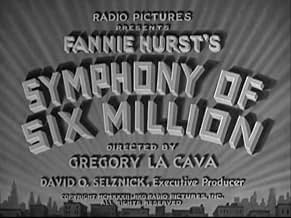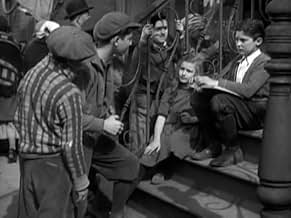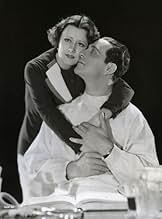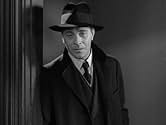NOTE IMDb
6,1/10
476
MA NOTE
Ajouter une intrigue dans votre langueA boy grows up to become a successful doctor at the expense of family relationships.A boy grows up to become a successful doctor at the expense of family relationships.A boy grows up to become a successful doctor at the expense of family relationships.
- Réalisation
- Scénario
- Casting principal
- Récompenses
- 2 victoires au total
Maurice Black
- Felix's Patient
- (non crédité)
Jesse De Vorska
- Mr. Horowitz - Hospital Patient
- (non crédité)
Harold Goodwin
- Intern at Hospital
- (non crédité)
Dorothy Gray
- Jessica - as a Girl
- (non crédité)
Julia Griffith
- Guest at Redemption Ceremony
- (non crédité)
Harry Holman
- Mr. Holman - Hospital Patient
- (non crédité)
Avis à la une
The scenes on Manhattan's Lower East Side in the 1930s are very convincing. The Jewish family in which Ricardo Cortez is a prodigy are too. The mama, played by Anna Appel, presages Molly Goldberg: "Yoo-hoo, Mrs. Fishbein," she calls out. Everything about the milieu seems authentic. (I'm not saying a 1932 film was shot on location but the setting was lovingly recreated.) Cortez, without his Latin-lover makeup and mannerisms, is very believable. I like him always. His name here is Felix and, though he plays a more somber than usual character here, it fits: His nearly omnipresent grin can remind one of Felix the Cat.
Gregory Ratoff is excellent as the stubborn patriarch of the household.
I watched it essentially because of my enduring fondness for Irene Dunne. (Director Gregory La Cava was no slouch either. His movies, especially the early ones like this, are always worthwhile.) Dunne plays a character named Jessica. Forgive me if I'm wrong but this does not sound like a name one would have been likely to encounter in the Jewish "ghetto," as the characters keep calling the neighborhood. She plays a teacher of blind children who limps.
She has very little to do and she acquits herself well. It seems like a waste of her special talents, though, and somewhat intrusive miscasting.
Nevertheless, the movie is touching and at times amusing. It's a rarity in its (generally) direct portrayal of lower-class Jewish life at the early part of the last century.
Gregory Ratoff is excellent as the stubborn patriarch of the household.
I watched it essentially because of my enduring fondness for Irene Dunne. (Director Gregory La Cava was no slouch either. His movies, especially the early ones like this, are always worthwhile.) Dunne plays a character named Jessica. Forgive me if I'm wrong but this does not sound like a name one would have been likely to encounter in the Jewish "ghetto," as the characters keep calling the neighborhood. She plays a teacher of blind children who limps.
She has very little to do and she acquits herself well. It seems like a waste of her special talents, though, and somewhat intrusive miscasting.
Nevertheless, the movie is touching and at times amusing. It's a rarity in its (generally) direct portrayal of lower-class Jewish life at the early part of the last century.
The story is nice, the theme pleasant (money isn't everything), but the outstanding element is the Jewish working-class background of a non-orthodox family. Not claustrophobic like the Jazz Singer and other self-pitying films, this film has an open and sunny attitude that makes it very accessible. Excellent, warm portrayals by Gregory Ratoff and Anna Appel as the stereotypical parents.
Like a good soup, there are many elements to this movie. You first have to start with a good stock. The stock in this movie is the Lower East Side of New York in the 30's. The hustle and bustle, the rag pickers, the pushcarts, the tailors, the fishmongers. The whole flavor of life in the Jewish ghetto. Without this backdrop the movie would fall flat.
Next are the ingredients. The cast in this movie is genuine and almost flawless. Gregory Ratoff as the father, Ricardo Cortez (Jacob Krantz) as his son - the doctor, and Noel Madison as the ambitious brother. They are all authentic and they are all Jewish. I said almost flawless because there is one flaw. Irene Dunne is cast as the love interest. She is a good actress, but she is clearly a shiksa in looks, speech, and mannerism. She stood out like a pork chop amongst the knishes and kugels.
Finally, none of this would matter if somebody didn't know how to cook. The story isn't original - as a matter of fact it is still being done today. A young boy grows up in poverty. A poor but nourishing neighborhood. He is part of a loving family which supports him in his quest to become a doctor. He succeeds and decides to devote his life to helping the underclass in the ghetto. His brother, meanwhile, becomes a successful businessman and convinces him that he should move "uptown" in order to make more money and help the family. He moves up the social ladder, becomes a raging success, and is celebrated by the rich and famous. Through a series of tragedies it becomes clear to him that he has lost his roots. It is only here,at the very end, that we have to give the director (probably at the direction of the producer David O. Selznick) a little melodramatic license. This movie was made in 1932 and drama was the order of the day.
You want subtle - watch something else. You want to choke up and feel good. Watch this.
Note: Although it was entirely unintentional, and could not have been imagined, there is an uncanny connection between the title of this movie and the holocaust which came to light a decade later. Six Million.
Next are the ingredients. The cast in this movie is genuine and almost flawless. Gregory Ratoff as the father, Ricardo Cortez (Jacob Krantz) as his son - the doctor, and Noel Madison as the ambitious brother. They are all authentic and they are all Jewish. I said almost flawless because there is one flaw. Irene Dunne is cast as the love interest. She is a good actress, but she is clearly a shiksa in looks, speech, and mannerism. She stood out like a pork chop amongst the knishes and kugels.
Finally, none of this would matter if somebody didn't know how to cook. The story isn't original - as a matter of fact it is still being done today. A young boy grows up in poverty. A poor but nourishing neighborhood. He is part of a loving family which supports him in his quest to become a doctor. He succeeds and decides to devote his life to helping the underclass in the ghetto. His brother, meanwhile, becomes a successful businessman and convinces him that he should move "uptown" in order to make more money and help the family. He moves up the social ladder, becomes a raging success, and is celebrated by the rich and famous. Through a series of tragedies it becomes clear to him that he has lost his roots. It is only here,at the very end, that we have to give the director (probably at the direction of the producer David O. Selznick) a little melodramatic license. This movie was made in 1932 and drama was the order of the day.
You want subtle - watch something else. You want to choke up and feel good. Watch this.
Note: Although it was entirely unintentional, and could not have been imagined, there is an uncanny connection between the title of this movie and the holocaust which came to light a decade later. Six Million.
... and Dr. Felix Klauber (Ricardo Cortez as the adult Felix) always seems to have the best intentions. The movie starts out showing Felix as a child studying on the doorstep of his family's ghetto tenement house, taking time to defend a local girl with a curved spine (Irene Dunne as Jessica) from some taunting street bullies. The movie spends a good deal of time focusing on Felix' home environment as a child. We learn that his parents are immigrant Jews, that his father has a kind heart but a bit of a temper, that his brother can be a trouble maker but only in the way that most boys can be, and that his mother is everything you'd want a mom to be. In other words, Felix lives surrounded by misery and poverty, but his own family is doing alright and he has a very good home. Felix is very thoughtful and decides the best way he can alleviate the misery of the poor is to become a doctor and treat everyone, regardless of ability to pay.
Unlike most childhood dreams, Felix works hard and makes his a reality. As a doctor he treats people both at his home - he still lives in the ghetto with his family - and at a local clinic set up for such work. Everybody is happy - except Felix' brother Magnus. Magnus has become a businessman, thinks everything should be for sale, and that includes medicine. He's unhappy that Felix still lives with his parents in the ghetto when he could set up a nice practice in the wealthier part of the city. Knowing his brother could care less what he thinks, he convinces their mother to beg Felix to go uptown based on the fact that their father is getting old and needs to retire. It works.
The next thing we see is Felix treating socialite women whose only problem is that they are bored and overweight, although he does get paid handsomely for it. Now everyone in the Klauber household is again happy - except Felix who realizes his talents are being wasted but just can't seem to break away from the ties that bind him to his new existence. He no longer even has time to spend with the family he did all of this for in the first place. How will all of this come out? I'll let you watch and find out.
The ending was a bit too melodramatic, but overall it was a pretty satisfying film. Another reviewer mentioned the one unusual precode element of this film - the detailed portrayal of a Jewish religious ceremony being performed towards the end of the film on Birdie's new born baby - Birdie was Felix' sister. The production code which began being enforced in 1934 only allowed Christian rituals to be shown. Another unusual element of the film - Jessica as Felix' love interest although she has a noticeably curved spine. Jessica teaches blind children and acts as Felix' link to his past and his once virtuous goals. It's almost like in the cartoons when you see a character with an angel on one shoulder whispering in one ear and a devil in the other. Jessica plays the part of the angel here, Magnus is the devil - however he's a smart enough devil to always send his mother as his mouthpiece. Who would say no to mom?
Unlike most childhood dreams, Felix works hard and makes his a reality. As a doctor he treats people both at his home - he still lives in the ghetto with his family - and at a local clinic set up for such work. Everybody is happy - except Felix' brother Magnus. Magnus has become a businessman, thinks everything should be for sale, and that includes medicine. He's unhappy that Felix still lives with his parents in the ghetto when he could set up a nice practice in the wealthier part of the city. Knowing his brother could care less what he thinks, he convinces their mother to beg Felix to go uptown based on the fact that their father is getting old and needs to retire. It works.
The next thing we see is Felix treating socialite women whose only problem is that they are bored and overweight, although he does get paid handsomely for it. Now everyone in the Klauber household is again happy - except Felix who realizes his talents are being wasted but just can't seem to break away from the ties that bind him to his new existence. He no longer even has time to spend with the family he did all of this for in the first place. How will all of this come out? I'll let you watch and find out.
The ending was a bit too melodramatic, but overall it was a pretty satisfying film. Another reviewer mentioned the one unusual precode element of this film - the detailed portrayal of a Jewish religious ceremony being performed towards the end of the film on Birdie's new born baby - Birdie was Felix' sister. The production code which began being enforced in 1934 only allowed Christian rituals to be shown. Another unusual element of the film - Jessica as Felix' love interest although she has a noticeably curved spine. Jessica teaches blind children and acts as Felix' link to his past and his once virtuous goals. It's almost like in the cartoons when you see a character with an angel on one shoulder whispering in one ear and a devil in the other. Jessica plays the part of the angel here, Magnus is the devil - however he's a smart enough devil to always send his mother as his mouthpiece. Who would say no to mom?
I have to say I expected more from this early thirties' Gregory La Cava Photoplay, especially since one of my favourite actresses, Irene Dunne, starred in it, but she had little time on screen (IMHO) and her role as a crippled girl, is pretty shallow, she had not yet blossomed into the great actress of "Theodora Goes Wild", "Love Affair" or "The Awful Truth".
This weepie (based on a Fannie Hurst novel, the same author who gave us "Back Street", "Imitation of Life", etc.) tells the story of a family of German immigrants, who lives in a poor Jewish ghetto in New York. Thanks to the profession of one of the sons, who grows to be a successful doctor (Ricardo Cortez), they find much better "horizons".
Ricardo Cortez, who has a Latin name but who was really born in Hungary, of Jewish background, does a fine job in the leading role, suffering a lot through the movie, 'cos he sacrifices his ideals for his family's sake. His parents are skillfully played by Anna Appel and Gregory Ratoff, who bring much truth to their interpretations.
I have to say that I enjoyed more the first part of the film which shows the life of this family when their sons were kids; there's a lot of "real" truth in the depiction of their lives, when they grow-up the film becomes more of a routine-soap opera.
Anyhow, I had never seen Ricardo Cortez in such a role, 'cos I was used to see him portraying continental men of the world or gangster-types, and as I stated before, he does a good job. Irene Dunne is less than half of what she had yet to achieve (in acting talent & beauty-I prefer her with longer hair).
No Pre-Codes aspects here, although it was released in 1932. Anyway, 1930's fans will have to see it.
This weepie (based on a Fannie Hurst novel, the same author who gave us "Back Street", "Imitation of Life", etc.) tells the story of a family of German immigrants, who lives in a poor Jewish ghetto in New York. Thanks to the profession of one of the sons, who grows to be a successful doctor (Ricardo Cortez), they find much better "horizons".
Ricardo Cortez, who has a Latin name but who was really born in Hungary, of Jewish background, does a fine job in the leading role, suffering a lot through the movie, 'cos he sacrifices his ideals for his family's sake. His parents are skillfully played by Anna Appel and Gregory Ratoff, who bring much truth to their interpretations.
I have to say that I enjoyed more the first part of the film which shows the life of this family when their sons were kids; there's a lot of "real" truth in the depiction of their lives, when they grow-up the film becomes more of a routine-soap opera.
Anyhow, I had never seen Ricardo Cortez in such a role, 'cos I was used to see him portraying continental men of the world or gangster-types, and as I stated before, he does a good job. Irene Dunne is less than half of what she had yet to achieve (in acting talent & beauty-I prefer her with longer hair).
No Pre-Codes aspects here, although it was released in 1932. Anyway, 1930's fans will have to see it.
Le saviez-vous
- AnecdotesAfter David O. Selznick became RKO's head of production in late 1931, he put the melodrama L'âme du ghetto (1932) (originally titled "Night Bell" after the Fannie Hurst story it is based on) into production, overseen by Pandro S. Berman. Selznick insisted that the original screenplay be rewritten to reclaim the ethnic touches from Hurst's story. Selznick likely wanted the film to serve as a mirror on to Jewish life, both of immigrants and their assimilated children. He himself changed the name of the film (a reference to New York City's population) as it was "more dramatic and dignified" than Night Bell. He also directed RKO music department chief Max Steiner to use symphonic music for the score and to have music throughout the picture. This was innovative as "talkies" rarely had an extensive score.
- GaffesAs is often the case when showing a devout Jewish home, a menorah, the traditional candelabrum, is displayed. However, this is used only once a year, so for the rest of the year it is put away. Having it on show is like having a Christmas tree up all year round to show that the family are Christians.
- Citations
Dr. Schifflen: My boy, there are two kinds of men in our profession. Some are gifted with the spark of genius; some of us are... just doctors.
[walks to the door and opens it, then turns back toward Felix]
Dr. Schifflen: Felix Klauber, you're more capable than I, but if you don't go through with this operation, I will.
- ConnexionsFeatured in David O. Selznick: 'Your New Producer' (1935)
Meilleurs choix
Connectez-vous pour évaluer et suivre la liste de favoris afin de recevoir des recommandations personnalisées
Détails
- Date de sortie
- Pays d’origine
- Langues
- Aussi connu sous le nom de
- Symphony of Six Million
- Lieux de tournage
- Coney Island, Brooklyn, Ville de New York, New York, États-Unis(amusement park)
- Société de production
- Voir plus de crédits d'entreprise sur IMDbPro
Box-office
- Budget
- 270 000 $US (estimé)
- Durée1 heure 34 minutes
- Couleur
- Rapport de forme
- 1.37 : 1
Contribuer à cette page
Suggérer une modification ou ajouter du contenu manquant

Lacune principale
By what name was L'âme du ghetto (1932) officially released in India in English?
Répondre
